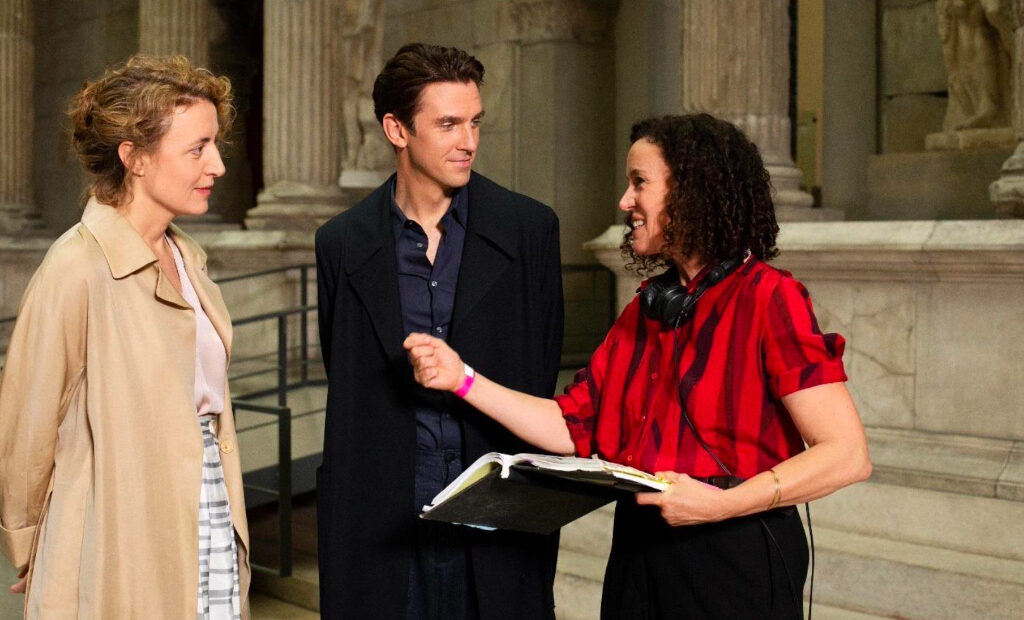I’m Your Man (Ich bin dein Mensch): An interview with director Maria Schrader and Jan Schomburg

Audiences who have a fondness for More4’s foreign language offerings might be familiar with the actress Maria Schrader. She played Lenora, the shrewdly manipulative East German spy in Deutschland ‘83 and its two sequels. Even more people will be familiar with the director Maria Schrader, who picked up an Emmy for helming Netflix’s massively popular Unorthodox. 2021 isn’t an orthodox year for anyone, and Berlinale is no different, but this year sees the premiere of Schrader’s Ich bin dein Mensch in a prestigious competition slot. The film tells the story of anthropology researcher Alma (Maren Eggert), who warily agrees to test a robot named Tom (Dan Stevens) who is designed to be her perfect partner. We spoke with Maria and her co-writer Jan Schomburg via the Coronavirus-proof safety of Zoom.
The film raises the question of artificial intelligence in daily life, and which processes have already been replaced. What are your thoughts about that?
Maria Schrader: I think there are far more processes already controlled by artificial intelligence than, for example, I would know. I think I read a story written by artificial intelligence, and I wouldn’t know how artificial intelligence interferes with my personal work. With Netflix, I probably would be able to track it a bit more, but not in other cases.
Jan Schomburg: I always try to check if I’m talking with a person or artificial intelligence, so every time I call a call centre, I say something really weird – just to check how they react, and so if it’s a person. You should try it. It evokes some really weird situations, it’s like you’re in a deep philosophical talk when you’re trying to get your washing machine fixed.
What was the importance of having Alma working in a museum? Did her profession made her a suitable candidate for testing a humanoid robot?
MS: Yes and no. No, it’s not accidental. Of course, we were talking about what she (Alma) could do. There’s the premise that she’s ordered by the dean of her university to be the expert, to have this examination (of the robot) for three weeks. So she had to be an intellectual in this academic surrounding, in anthropology. So we thought: what could it be? And we ended up with the idea of cuneiforms, so we approached the Pergamon Museum, and we knew about this beautiful portal, this beautiful architectural stage from antiquity (The Pergamon Altar, which dates back to the 2nd century BC). And they unexpectedly let us shoot – we were the first fictional movie to shoot there. It was always a very visual idea to have Tom, this machine from the future, encountering the history of mankind, and being very impressed by it.
Did the story appeal to you in that the robot isn’t a woman designed to serve a man?
MS: Usually it’s the other way around. When I think of Humans, when I think of Ex-Machina – it’s mostly – or at least, let’s say it felt like something that was not so experienced the other way around, and I was very intrigued by that. For once, to have the man treated like an object by her, as a tool – a manufactured tool to fulfil a woman’s wishes and desires. This is the reason for his existence. And I think it’s still an experience we’re not so much used to. She says to Tom, “You’re designed for me, so let’s see your penis – I want to see it.” There is something to it which is not a common narrative, and in that regard, maybe it contributes something.
How did you go about creating authentic dialogue for a robot? Did you allow Dan Stevens to ad lib in German?
MS: No one was allowed to change the words! He wouldn’t go for it, because it was hard work for him to learn these lines, and he speaks a very elevated German, so Dan Stevens’ German is very good, but perhaps not good enough to improvise on that level.
JS: I was thinking of my own experiences – I could watch Who Wants to Be a Millionaire in a foreign language, for example, English. It would be totally okay with some questions, although not as okay as in German, but it’s the really easy questions that a child would know, I just wouldn’t know, because I wasn’t raised with this other language. What was fun about writing dialogue for him was all those things somebody wouldn’t know that’s it’s totally not cool to say now.
MS: And what’s the English subtitle when he says the word “peachy”? Alma tells Tom that it will take her a while to come back, and he says, “Peachy.”
And she told him to add it to all the other outdated words he shouldn’t say.
JS: That was the fun part of it – to give these silly, little bit old-fashioned words. And that he would be able to analyse these human emotions very precisely, and, for me, that was the most disturbing moment in the movie, when you think about this complex emotion I have, and I cannot explain it to you because you’re a robot, and then the robot explains it, and you think yeah, it’s just a few sentences.
MS: It was also fun how Tom mentioned Rilke, for instance, when he was asked about his favourite poem. It makes me smile, but maybe this is a German thing, because Rilke is the obvious writer you could imagine – it’s a cliche. It’s like, oh yeah, of course.
It’s the story of a woman meeting a robot, and yet you managed to avoid all the sci-fi tropes. Was that deliberate?
MS: This is the first day we showed the movie to people we don’t know. It’s a celebration for us – it’s delightful because we understand this simple agreement. Dan Stevens is a robot, and we don’t show, you know, all the CGI; we don’t open his head like Spielberg does in AI, we don’t really prove that he is a robot in this sense. And it works. People buy it, and they go on this trip, this story, and they think, “Alright, Dan Stevens is a robot.” And of course, he does his part with his acting, but there’s a fairytale aspect to it, and it was indeed a conscious choice. It could also be tempting to invent a future world, but we would also have had to make some choices about what society is like in the future; what the political situation is. And I think that we started to set the story in our time, nowadays Berlin, and so we could easily identify with Alma – her encounter with Tom was as hard on her as it would be on us. It allows us to really concentrate on this experiment of thought. I would also call it a film about Man, [more] about humankind than about robots.
Oliver Johnston
Photo: Christine Fenzl
Read our review of I’m Your Man (Ich bin dein Mensch) here.
Read more reviews from our Berlin Film Festival 2021 coverage here.
For further information about the event visit the Berlin Film Festival website here.
Watch the trailer for I’m Your Man (Ich bin dein Mensch) here:
























Facebook
Twitter
Instagram
YouTube
RSS